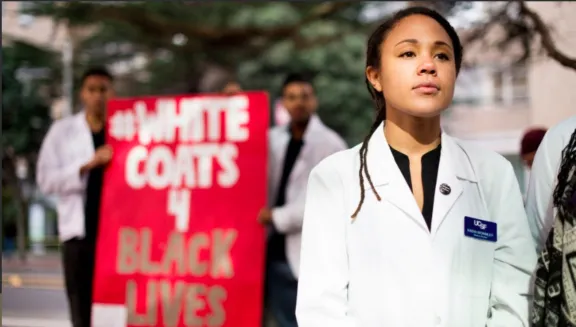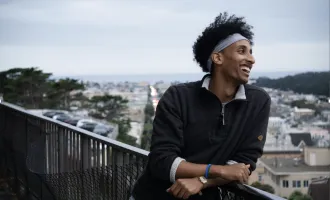
UCSF Health Professional Students Model An Anti-Racist Curriculum
UC San Francisco health professional students and White Coats for Black Lives (WC4BL) joined trainees, faculty, administrators, staff, and community members for a teach-in, featuring the Black Caucus, Zoé Samudzi, and Adriana Camarena, on December 11, 2018.
This teach-in explicitly modeled an anti-racist curriculum leveraging external, individual, and organizational expertise on subjects ranging from the origins of Black resistance at UCSF to what happens to the family members and friends who survive a victim of police violence.
At the teach-in, participants viewed excerpts from the UCSF Archives and several critical race theorists.
Participants then engaged in open conversation about the differential valuation of bodies in healthcare and throughout the Bay Area.
Students from all six professional and graduate schools including Dentistry, Medicine, Nursing/Midwifery, Pharmacy, Physical Therapy, and the Graduate Division asked UCSF administration to provide a unified anti-racist curriculum highlighting the critical concepts of race including the mechanisms through which whiteness — as a marker of status and normalized exception — continue to dominate and determine the life trajectories of people of color.
Participants drew connections between the mass incarceration of Black people and the detention of undocumented immigrants. They asked questions in an open-air forums of one another and identified parallels between the surveillance of Black neighborhoods and the surveillance of hospital waiting rooms.
This event marked the fourth anniversary of the WC4BL organizational start. WC4BL is a medical student-run organization born out of the National White Coat Die-In demonstrations on December 2014.
During these demonstrations, over 3,000 medical students across 80 campuses nationwide laid on the ground in their white coats to demonstrate solidarity with communities protesting police violence and to publicly state that health professionals must confront institutionalized racism as a public health issue.
This year’s event highlighted the need to continue to recognize the weight of Black and Brown casualties — in the healthcare professions and beyond.
Students also emphasized how a twenty-first century healthcare education should prioritize not only the elements of explicit racism and implicit bias but also the structures that lead to contagious eviction, receipt of health services in handcuffs, legal execution, inherited incarceration, and deadly borders.
Medical students interested in organizing around the issue of police violence as a public health issue can contact White Coats for Black Lives at national@whitecoats4blacklives.org.


